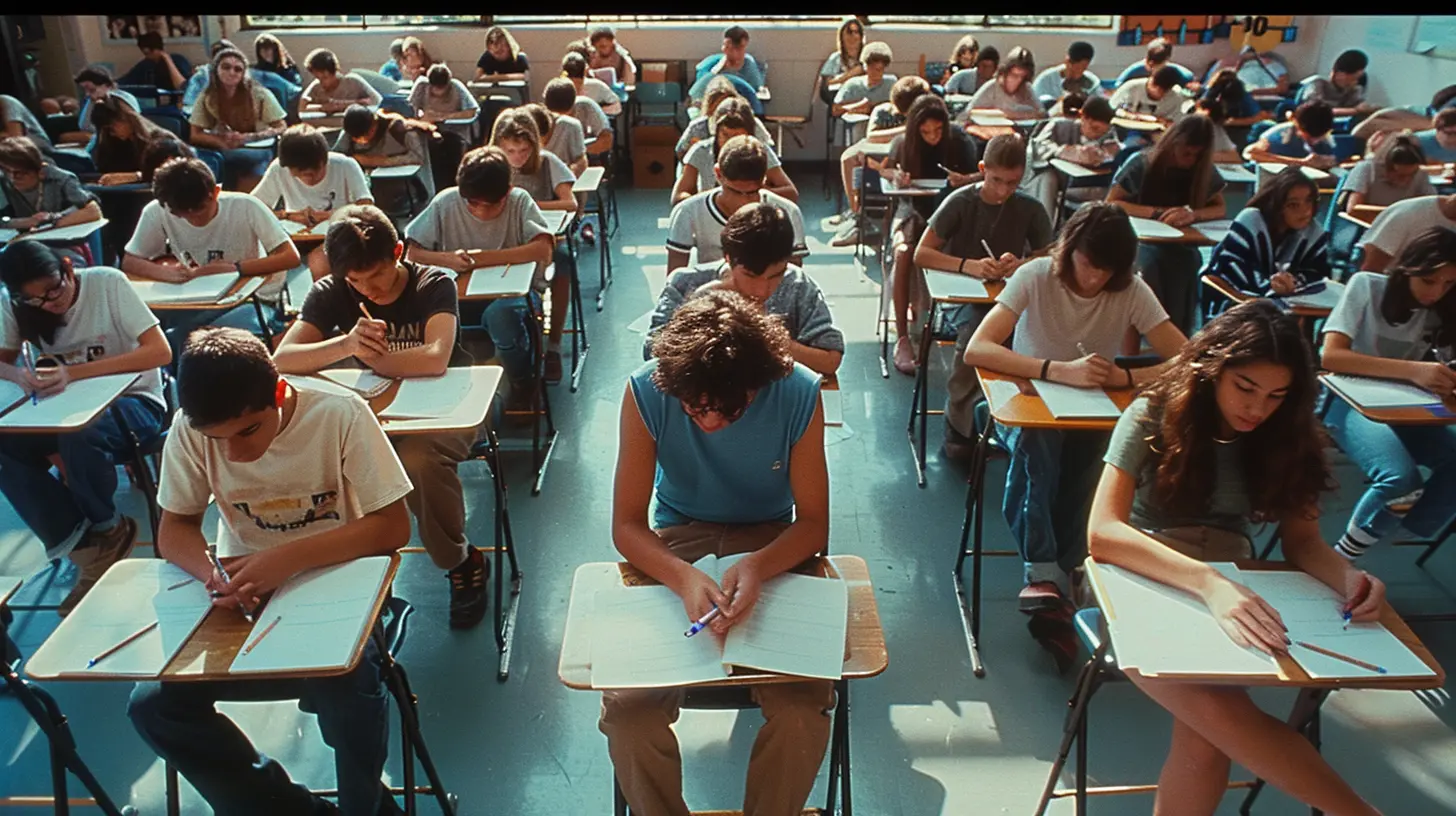Common Mistakes Students Make on Standardized Tests and How to Avoid Them
26 September 2025
Let’s face it—standardized tests can feel like a mountain looming in the distance. Whether it’s the SAT, ACT, GRE, or any other test looming on your academic horizon, you’ve probably heard countless horror stories about how easy it is to mess up. The truth is, many students fall into the same traps over and over again. It's not about being "bad at tests"—it's often just about not knowing what to avoid.
So, before you dive into another test-prep session, let’s talk about some of the most common mistakes students make on standardized tests—and more importantly, how you can steer clear of them. Trust me, a few tweaks to your approach can make a world of difference.
1. Not Understanding the Test Format
Why It Matters
Would you walk into a basketball game not knowing the rules? Probably not. The same logic applies to standardized tests. If you don’t fully understand the format—how many sections, the types of questions, timing, scoring—you’re playing blind.How to Avoid It
- Get your hands on an official practice test.- Read through the structure and directions for each section before test day.
- Get familiar with the types of questions that will be asked. This way, there are no surprises.
Pro Tip: Practice under real testing conditions. Use a timer, sit at a desk, and minimize distractions. Simulating the environment helps reduce anxiety and sets realistic expectations.
2. Cramming at the Last Minute
Why It’s a Trap
We’ve all been there: pulling an all-nighter, eyes glazed, chugging coffee like water. But cramming is like stuffing a suitcase right before a trip—it’s messy and inefficient. Your brain needs time to absorb and retain information.How to Avoid It
- Create a study schedule at least a month in advance.- Use spaced repetition. Review the same material multiple times over several weeks.
- Break study sessions into manageable chunks. You’re aiming for consistency, not burnout.
Think of it this way: Studying for a test is like training for a marathon. You can’t just get up and run 26 miles without putting in the time and effort. Slow and steady really does win the race.
3. Skipping Practice Tests
Why It Matters
Would you play in a piano recital without rehearsing? Didn’t think so. Practice tests are your dress rehearsals. They show you where you shine and where you need polishing.How to Avoid It
- Take at least two to three full-length practice tests before the real thing.- Review your results thoroughly. Don’t just look at the score—unpack the "why" behind your incorrect answers.
- Adjust your study plan based on your weaknesses.
Practice tests aren’t just about improving accuracy—they help build endurance. It’s about training your brain to stay focused for several hours.
4. Ignoring Instructions
Big Mistake
It sounds silly, but you’d be shocked how many students lose points because they rush through directions or misunderstand what a question is asking.How to Avoid It
- Slow down during the instructions. Take a breath. This isn’t a race.- Actively underline or highlight key parts of a question, especially on reading comprehension and math word problems.
- Always double-check what the question is asking before selecting your answer.
Remember: If you don’t understand the rules of the game, even the best strategy won’t help you win.
5. Poor Time Management
The Clock Is Ticking…
Time is not your friend on standardized tests. Many students spend way too long on one question and then scramble through the rest.How to Avoid It
- Practice pacing during your prep.- If a question stumps you, skip it and come back later. Don't let one tricky problem derail your entire section.
- Use the process of elimination to narrow down choices quickly.
Quick Tip: Know how much time you have per question. For example, if you have 60 minutes for 60 questions, that's one minute per question. Keep a mental timer running.
6. Getting Stuck on One Question
Don’t Sink the Ship
One question shouldn't sink your whole test. But too many students get tunnel vision, wasting precious minutes trying to solve a problem that won’t budge. Not worth it.How to Avoid It
- Learn to identify time traps—those confusing, multi-step, or unfamiliar questions.- Mark and skip. Flag the question, move on, and circle back if you have time.
- Stay emotionally detached. A hard question isn’t a reflection of your intelligence. Keep moving.
Think of your test like a battlefield—you don’t win by fighting every single enemy head-on. Sometimes, the best strategy is to retreat and return later.
7. Overthinking Easy Questions
Yes, Some Are Actually That Simple
Not all questions are out to trick you. But when students expect every question to be complicated, they start over-analyzing even the straightforward ones.How to Avoid It
- Trust your instincts. If an answer jumps out right away, it might be right.- Don’t second-guess a simple logic or math step—unless you’re certain you’re missing something.
- Practice recognizing patterns in question types to build confidence.
Overthinking is like turning a speed bump into a mountain. Save your brainpower for the tough stuff.
8. Not Reviewing Mistakes
Growth Comes from Feedback
Your mistakes are goldmines of information—but only if you take the time to examine them. If you breeze past wrong answers and never figure out why you missed them, you’re bound to repeat them.How to Avoid It
- After each practice session, spend as much time reviewing as you did taking the test.- Keep a “mistake journal” to track errors and trends.
- Ask yourself: Did I misunderstand the question? Did I rush? Was I distracted?
Fun Fact: Most students improve faster from mistake review than from new studying alone.
9. Letting Anxiety Take Over
Nerves Happen. Don’t Let Them Win.
Test anxiety is real—and it affects even the brightest students. When you're anxious, your brain literally struggles to recall information and think clearly. Not ideal during a test, right?How to Avoid It
- Practice deep breathing techniques and positive visualization.- Avoid pre-test panic by preparing well in advance.
- Keep a routine. Eat a good breakfast, arrive early, and wear comfy clothes.
Think of anxiety like static on a radio. The more you turn the volume of preparation up, the quieter the noise becomes.
10. Wasting the Break Time
Every Minute Counts
Most standardized tests have built-in breaks. But many students treat this like nap time or scroll-through-Instagram time.How to Use Breaks Wisely
- Stretch your legs, grab a snack, and hydrate.- Don’t dwell on what just happened in the last section.
- Reset your mindset: “Okay, that section is done. On to the next one.”
Breaks are your brain’s chance to reset. Treat them like a pit stop in a race—refuel and refocus.
11. Forgetting to Bubble Correctly
The Silly Slip-Up
All that studying… wasted by misaligning bubbles or skipping a question without updating your answer sheet? It's more common than you'd think.How to Avoid It
- Stay aligned with the question number. Double-check every few questions.- If you skip a question, be extremely careful when you return to it.
- Fill bubbles completely and cleanly. Don’t leave stray marks.
It’s like doing all the work for a recipe and then forgetting to turn on the oven. Small things matter.
12. Failing to Prepare Logistically
Don't Self-Sabotage at the Starting Line
Ever heard of someone missing their test because they brought the wrong ID or arrived late? Yep, it happens. Logistics matter.How to Avoid It
- Know your test center location and arrival time.- Pack your bag the night before: ID, admission ticket, pencils, calculator, snacks.
- Set multiple alarms. Seriously.
Imagine training for months, only to trip at the starting line. Not cool.
Final Thoughts: You’ve Got This!
Standardized tests might feel like a beast, but they’re not unbeatable. The key is not just studying hard—it’s studying smart. Avoiding these common mistakes isn’t rocket science. It just takes awareness, preparation, and a little bit of strategy.So, the next time you're staring down that bubble sheet, remember: you've put in the work, you've sidestepped the pitfalls, and you’re more than ready. Own your test like a boss.
Frequently Asked Questions
Q: How far in advance should I start preparing for a standardized test?
A: Ideally, aim for at least 6–8 weeks for solid preparation. However, even 3–4 weeks of focused studying can work if you stay consistent and take practice tests.Q: What if I panic during the test?
A: Take a brief moment to pause, close your eyes, and take three deep breaths. Refocus your energy. You've trained for this. Keep moving forward.Q: Should I guess if I don’t know the answer?
A: Absolutely. Most standardized tests don't penalize for wrong answers, so never leave a question blank unless instructed otherwise.all images in this post were generated using AI tools
Category:
Standardized TestingAuthor:

Eva Barker
Discussion
rate this article
1 comments
Weston Morales
Standardized tests can be tricky! Avoid common pitfalls and you'll be golden. Remember, even the best can stumble—just keep calm, breathe, and rock that bubble sheet like a pro!
October 12, 2025 at 12:25 PM

Eva Barker
Thank you! Great tips on staying calm and focused. Avoiding common pitfalls can truly make a difference in test performance.


